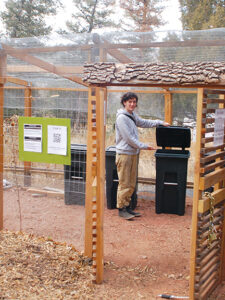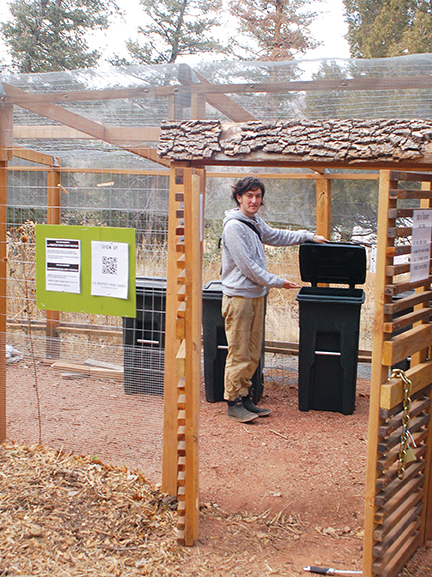Photo by Larry Ferguson

“So far, so good,” said Nat Stein, director of food production for Food to Power, talking about Manitou’s new compost drop-off location that opened this fall. “There’s a contingency of people who are ready and waiting for this sort of thing.”
The drop-off site, several large bins for household scraps and other compostable material inside a bear-proof wood and wire enclosure, is located near the entrance to the Flying Pig Farm, an urban educational farm on Keithley Road, just off Crystal Park Road.
Membership in the service, which features a weekly collection, also includes the return of a bucket of finished compost twice a year. The program is based on a pay-if-you-can plan; those who can pay may choose from $9, $12 or $15 a month subscriptions.
Members are provided with the combination to a lock on the enclosure’s gate. The site is open daily from 8 a.m. to 8 p.m.
“As soon as they heard about it, some people decided ‘that’s the solution for me,’” Stein said, explaining that some residents may have tried composting in their backyards but discovered they just didn’t have the time or space for the project.
“Still, it was ‘I know I want to do this’ for many residents.”
Stein explained that the collection bins hold a variety of food scraps and organic materials, including fruit, vegetables, eggshells, bread, rice and pasta, along with paper, cardboard, coffee grounds and leaves. Plastic, rubber, metal, glass, meat, dairy, packaging, tape and waxy paper are not accepted. (Members receive a detailed list of compostable materials.)
Food to Power staff and volunteers collect the food scraps and take them to Midway Landfill, a regional composting facility off Interstate 25 between Colorado Springs and Pueblo.
“There’s a common misconception that food scraps are compost,” Stein said. “They aren’t. Once the scraps are collected, they are mixed with carbon-rich materials, and given time to break down into something more like soil that is rich in nutrients.”
The advantages of composting are many, Stein said, pointing out that it cuts down on methane emissions from landfills, conserves water, decreases erosion and improves soil health.
Food to Power, previously called Colorado Springs Food Rescue, aims to reduce food waste while increasing food availability. The group, consisting of about a dozen staff members and a network of volunteers, launched its compost program in 2018.
The nonprofit, headquartered at 917 E. Moreno Ave., Suite 130, plans to open its Hillside Hub facility on 3.5 acres of land in southeast Colorado Springs in spring 2022. Spaces for an urban farm, compost production, workshops and grocery distribution are planned.
“The Hillside Hub project is a centralized hub where people can learn about food, access fresh food, grow food, eat together and learn from each other,” Stein said. “We plan to have a community-scale composting system.”
Currently, the group conducts compost pickups at three locations: the Westside Community Center garden, 1614 W. Platte Ave.; the Ivywild School, 1604 S. Cascade Ave.; and Manitou. Residential curbside pickup is also available in some Colorado Springs areas.
“We were hearing a lot of interest from people all over the city,” Stein said, “especially from Manitou, which didn’t come as a big surprise.
“The Flying Pig Farm’s mission and values align with ours, and the city of Manitou has committed on a municipal level to climate action. It’s a community that understands the value of our natural resources.
“The advantage and value of composting is you don’t have to have this dead end for our food. There are such huge benefits to composting our soils in terms of water retention, recharging the water cycle, cooling the atmosphere and revegetating.”
Stein also said the coronavirus pandemic has resulted in an awareness of what can happen with the disruption of food security and with supply chain disruptions.
“Going to the grocery store and not finding food on the shelves got a lot of people into gardening during hard economic times. If you have soil, you have resources to provide your own food.”
Information: foodtopowerco.org, nat@foodtopowerco.org or 719-470-2737, ext. 706.

